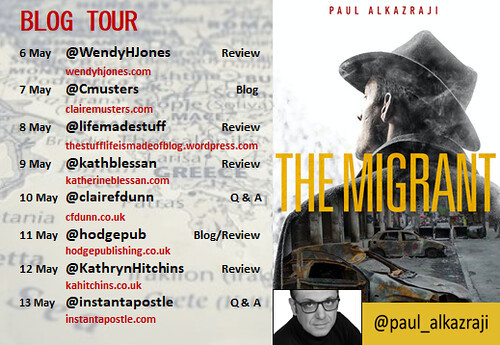Paul Alkazraji's Blog - Posts Tagged "migration"
Macedonian Migration
Went to the Idomeni refugee/migrant transit camp on the Greek border with FYR Macedonia yesterday, which receives thousands of people per day on route for Germany and northern Europe. We drove the 600km round trip to give them our gifts of 90 litres of water, plastic sheeting for 19 families, medicines and a big sack of shoes. Here’s a snap. We had a blessed day!
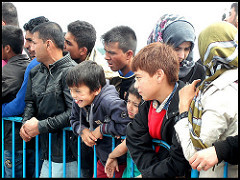
http://www.bbc.com/news/world-europe-...
‘Arrests have been made in the breaking of a people-smuggling gang by the French police in Calais, reports the Daily Mail. It’s believed to have smuggled 100 Albanian nationals into the UK, transporting them by boat to remote coves on England’s south coast between Weymouth and Plymouth…’ As such stories emerge, find out more about life in Albania through ‘The Silencer’; a novel set both there and in the UK.
https://www.goodreads.com/book/show/1...

http://www.bbc.com/news/world-europe-...
‘Arrests have been made in the breaking of a people-smuggling gang by the French police in Calais, reports the Daily Mail. It’s believed to have smuggled 100 Albanian nationals into the UK, transporting them by boat to remote coves on England’s south coast between Weymouth and Plymouth…’ As such stories emerge, find out more about life in Albania through ‘The Silencer’; a novel set both there and in the UK.
https://www.goodreads.com/book/show/1...
Published on October 01, 2015 05:45
•
Tags:
albania, calais, greece, macedonia, migration, people-smuggling, united-kingdom
Bringing smiles to the child refugees held in a toilet paper factory
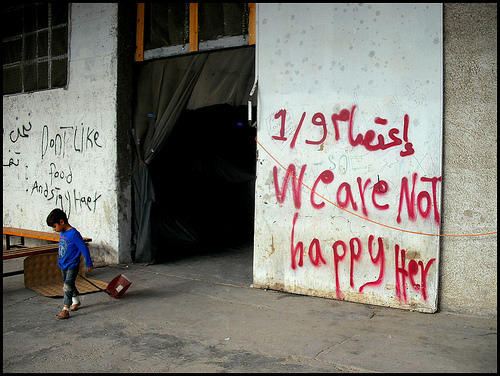
Words and photos by Paul Alkazraji.
At a refugee camp in a former toilet paper factory in northern Greece, a team of volunteers from an Albanian church has been bringing a little happiness to those trapped in the difficult living conditions.
In the ‘Softex’ camp on the industrial periphery of Thessaloniki, over a thousand mostly Syrians have been hastily accommodated after an informal camp at Idomeni, near the Macedonian border, was closed in May.
It is one of many where some 57,000 refugees are now held in official government camps throughout Greece, in a measure aimed at dealing with Europe’s huge migration crisis after border fences were hastily built and the Balkan migration route closed.
Teams from The Kennedy Foundation in Albania have been making weekly runs here since the spring to bring children’s activities including face painting, action games and a bouncy castle. Under the umbrella of volunteering organisation InterVolve, they also bag up and distribute fresh vegetables tent by tent up to 600 portions a day.
Many of those tents have been erected inside the ‘Softex’ factory to provide additional shelter from the none-to-distant winter. In the gloomy darkness children push each other around in rickety prams and play with broken bricks. There are makeshift street stalls, coffee shops and flat-bread bakers, and it has all the aromas both sweet and foul of a Damascus souk.
Though attempts have been made to improve the comfort of those stuck here in limbo, and NGOs and other inter-governmental agencies are present, there are reports that women and children have been afraid to leave their tents after dark for fear of sexual assault from other refugees.
“When we first came here, I saw they were living in bad conditions, and if you’d asked me to enter, I would not,” says Kennedy team member Klaus Kalemi. “But I did because I wanted to help. I feel terribly sorry for what has happened to them. They came from war and we should have better places for them. I think that all of them were hoping for a better future, because I saw the writing on the walls here everywhere.”
Klaus and others in the Albanian team communicate with the Arabic words they’ve learned, and face paint and manicure all those who come to them. “I saw that the children were smiling and happy and kept calling us ‘fri-ends’, even though I was here for the first time,” he says. “That was really touching. They knew the sign on my shirt. It has the word ‘hope’ written on it, and everyone who saw it knew the meaning.”
One small boy, Mohamed, from Deir ez-Zur in eastern Syria, was very happy with his Spiderman face paint design. He was in the camp with his parents, two sisters and four brothers. “We came at night in a boat. It had a motor and there were no waves. In the morning we were in Greece. I did not see any fish,” he said.
Kennedy team leader Lysiena Topi says: “When I heard about the situation, I thought I had to do something. I loved these people when I first met them in Idomeni. You can see in their eyes that they just need some attention, to see that people love and care about them.”
“One of the most needed things in the camp is something for the children,” she says. “You can see them fighting because they don’t have anything to do. When we went in, at first the managers would say to us, ‘Okay you can try!’ But after we had finished the festivals, they would say, ‘You are an amazing team. We don’t know how you do it. These kids love you!’ We see the smiles in their eyes...”
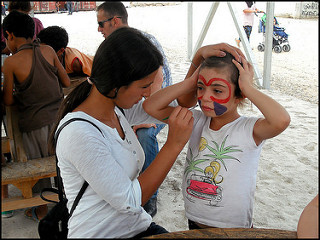
Written for ASSIST NEWS.
By this author:

Published on October 20, 2016 10:07
•
Tags:
child-refugees, greece, migration, softex-factory, war-in-syria
'The Migrant' to be published soon...
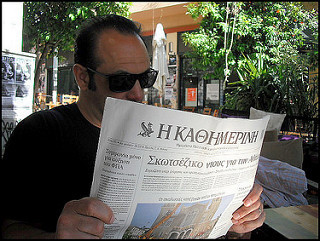
Some good news to share… I’m very happy to say that I just signed with a UK publisher for the novel I’ve been working on for a couple of years now – and finished, well, more or less. All being well, that should be out early next year. Hurray! (The photo is of me doing research for the story in Athens two years ago – well, pretending to read a Greek newspaper actually :) )
Early draft blurb for 'The Migrant' (working title).
‘No one has heard from Alban since he set off through the Albanian mountains to seek work illegally in Greece. Pastor Jude Kilburn is growing increasingly concerned. Could something have happened to the youth on route in the border forests? Could he remain safe in the Athens underworld if that was where he’d gone?
As the anti-austerity riots of 2012 explode, and the populist ‘Neo-Hellenic Front’ marches through the Greek capital, Jude gathers the help of two incompatible friends and sets off to find Alban. With him are Albanian Secret Service man Luan Gurbardhi, and reformed ex-criminal Mehmed Krasnichi. But can Jude keep his search party from falling apart?
When Donis Xenakis, a Greek riot-policeman and ‘Neo-Hellenic Front’ sympathiser, gets caught up in a diabolical plot to attack migrants, Jude could never have anticipated the unimaginable danger Alban is in. Nor can he foresee how a trafficked girl there will change all their outcomes.
‘The Migrant’ is a tense and evocative ‘road adventure’ with a powerful message and a tragic, yet ultimately redemptive, twist.’
Publisher: ‘Instant Apostle’.
Previously by this author:

Published on August 04, 2018 13:59
•
Tags:
2012, albania, anti-austerity-riots, athens, economic-crisis, greece, migration
Road trip with 'The Migrant'
A case of mistaken identity
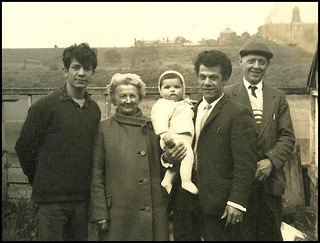
As I cycled along a city ring road once, my saddle was grasped from behind. A youth on a bike with cow horn handlebars scraped his shoe along the tarmac as he dragged us both to a standstill. He simply stared at me.
“What do… you want?” I said. He didn’t offer a word. His fist then slammed into my nose. He yanked back on his cow horns and wheelied off.
In the wake of the Black Lives Matter protests following the death of George Floyd, many previously silent people have given voice to their own experiences of racism. Like other mixed-race children growing up in England, I too felt a measure of it.
Another time, when I found a school door was locked, I tapped on the glass at a passer-by to let me in. He opened the door, showered me with a face full of spittle, locked it again and walked off. Sometimes, motives for actions were not stated; on other occasions, however, they were verbalised with venom.
I was aware then, though, that many English children were mistreated, often worse than me, for being different in some other way. Though my own experiences hurt, they were far outweighed by the friendship, help and affirmation I received from others in England as I grew up. Everyone needs to learn to forgive those who sin against them, as our own thoughts, words and deeds against others are forgiven.
When as an adult I moved to live and work with the church in Albania, I experienced racism from another angle: how some Greeks view those from their neighbouring country. When one Greek filling-station attendant eyed my Albanian car registration plate, I was actually refused petrol. I am stopped and questioned constantly by the Greek police on motorways, at road-toll stations and in supermarket car parks. Then, a cheerful ‘good morning’ and an offering of my British passport noticeably changes their attitude and my treatment.
This brings its own particular feeling of mistreatment: of being mistaken for something you know you are not. It perhaps gets to the crux of the matter: being seen as inferior, less human, potentially criminal even, on the basis of a wrong assumption. It has certainly made me more sympathetic to Albanians.
Many of these incidents of ‘mistaken racism’ were reworked into a novel I wrote called ‘The Migrant’. It tells the story of an Albanian youth who sets off to Greece in search of work and a better life, and three friends who set off to Athens to find him. There they encounter police brutality and casual racism on the roads, as well as populist rallies and organised attacks by a resurgent far right group.
On their way home, as the characters lament such struggles, they talk of a time and place where people of every race and nation will be welcomed and equally valued: where there will be no more crying and pain. Until then, there is longsuffering for so many, but it is eased with a sweet and certain hope that this place is prepared for us - and that we will get there.

'Racism... that's illogical captain!'
Paul Alkazraji's novel ‘The Migrant’ is published by Instant Apostle.
Find copies of ‘The Migrant’ here: https://www.amazon.co.uk/gp/product/B...

'The Migrant' Novel - Q and A
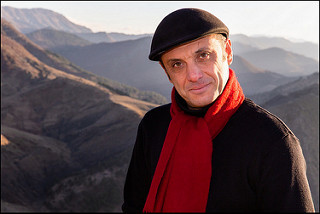
The author Paul Alkazraji in the Albanian mountains
close to the border with Greece. Pic: Andrew LaSavio.

Where does the story begin?
In the spectacular forested mountains bordering Albania and Greece, close to Little Prespa Lake, at dusk. A young Albanian man, Alban, and his friend, sneak past a watchtower to enter Greece illegally in search of work, but they are spotted by a border guard and a chase to catch them begins.
What is the story about?
It is about a pastor, Jude Kilburn, who takes on the responsibility to care enough for another person in his village, the young man, Alban, that he is ready to go the extra kilometre, over 500 of them in fact, to Athens to see if he is safe.
What happens in Athens?
Jude arrives in the Greek capital as dangers all around Alban are building - violent anti-austerity riots, the rise of far right political groups and racist attacks, the clutches of a trafficking gang, and a cynical police operation - then races against time to find him.
Did you personally make the journey in the story from Albania to Athens?
Yes, I drove down through Greece myself in an old Mercedes with two companions to experience the sights and sounds of the country, past Mount Olympus and Delphi. I then spent time in central Athens, in Plaka and Exarcheia, so I could evoke a keen sense of time and place as a backdrop.
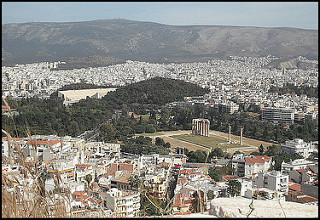
The view across Athens from the Acropolis.
What inspired you to write it?
I have worked for some years in Albania, and seen first-hand the struggles and risks many Albanians face to escape poverty and unemployment and find work abroad. It is, in a way, their story I am telling.
What are its themes?
It deals with people searching for a better life, without poverty or violent conflict, with migrants of the recent mass-movements up through southern Europe, and with dreams that turn sour. It deals too with where our final hope lies for finding such a destination of prosperity and peace.
Do you have a favourite scene from the book?
There are scenes on the Acropolis and in the middle of a riot in Syntagma Square and more that I hope are vivid enough to immerse the reader totally in energy of the moment.
Do you have a favourite minor character?
Some of them would be ‘Che’ Chaconas the anarchist, Granit Korabi the criminal gang member, and Stavros ‘The Big Man’ and Neo-Hellenic Front member. But the protagonist, Jude, the pastor who takes on the search for Alban, has more of my personal empathy.
Do you have a favourite sentence from the book?
The life of the poet Lord Byron has parallels with Alban’s life, and I have quoted him a few times. This one from ‘Don Juan’ is a favourite: ‘Between two worlds life hovers like a star, twixt night and morn, upon the horizon's verge.’ It sums up the story.
Can we guess the ending?
There is a kind of justice in what happens in the epilogue. Originally, it wasn’t planned that way, so I didn’t! The scene was added later. But maybe you will guess it?
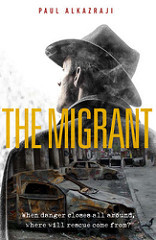
Amazon links to 'The Migrant':
UK: https://www.amazon.co.uk/Migrant-Paul...
US: https://www.amazon.com/gp/product/B07...
Easy Listening...
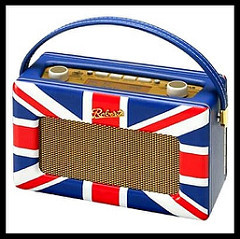
Radio Days.
Where is Albania... exactly? Is there religious tolerance now in ‘the world’s first atheist state’? How did the economic crisis in Greece affect its people? Grab a latte or espresso, put your feet up and listen in for a few minutes to one of these radio recordings :)
Chatting on...
'Trans World Radio' about the Greek Debt Crisis and migration from Albania...
https://www.mixcloud.com/Muthena/gree...
'United Christian Broadcasters' on the Paul Hammond Show about Albania's history and the church in the country...
https://www.mixcloud.com/Muthena/pope...
'Branch FM' about a Yorkshire childhood, journalism and finding faith in Jesus… https://audiomack.com/artist/paul-alk...
By this author:

Published on December 03, 2020 08:54
•
Tags:
albania, greek-debt-crisis, journalism, migration, the-church, yorkshire
'The Migrant' blog tour 2021

'The Migrant': Three incompatible characters set off from Albania on a dangerous journey to find a missing relative in Athens at the time of Greece’s economic crisis, encountering police brutality, racism and restored relationships along the way.
Follow the blog tour here as seven writers share their thoughts about the novel...
Blog Tour #1 'And what... makes this novel so good, well to start with its the main character, Pastor Jude Kilburn as he is taken through a perilous journey...' says Lynsey Adams. (Scroll down a little.)
https://readingbetweenthelines4067781...
Blog Tour #2 A very thoughtful and engaged review from S C Skillman. @scskillman
https://scskillman.com/2021/09/07/boo...
Migrants make for the mountains

Albanians heading for the mountains. Pics, Peter Wilson.
Excerpt from 'The Migrant' novel: A suspense story about a British Pastor, Jude Kilburn, as he travels to Athens to find an Albanian member of his church, Alban Gurbardhi, who has migrated there illegally in search of a better life. This as the riots surrounding Greece’s recent economic collapse explode, and a neo-Nazi movement closes in for a fatal, racist attack on Alban.
From Chapter 1.
Context: Alban Gurbardhi and his friend Ervin run into trouble as they attempt to cross the border illegally between Albania and northern Greece in search of work.
Ten minutes later, he was following the ravine back upstream until he could make out the arch of the stone bridge ahead of him. The sound of Ervin screaming and pleading had grown louder. He winced. He crawled closer on his front up a bank and set aside his sack. He peered over the edge of the clearing and he saw his friend being held by his shirt at the neck. The policeman flung him down and kicked him. Ervin moaned and rolled over.
Sliding back down lower, Alban closed his eyes. He thought about what he could do. He opened them and looked at his hands. They were trembling. He saw a broken branch by his side. It looked thick but dry and rotten. He stretched his hand towards it, and with the tips of his fingers pulled it closer and into his palm. He eased himself onto his back and began to breathe deeply. He saw his breath steam rise high in gusts. He looked up at the millions of stars in the clear Balkan night above him. In his field of vision the policeman suddenly entered and stood looking down on him. For a split second he saw his broad, muscular shoulders, his hair sheared close across his temples, and his eyes – yet one was odd. In fear and panic he brought the branch up into the man’s face and it smashed there into pieces. The man groped at his eyes and tumbled down the bank.
Alban got to his feet, grabbed his sack and ran towards Ervin. He pulled him up off the ground and looked at his face. It was dark and blood-sticky.
‘Hey, friend. Are you coming with me to Greece?’ he shouted. A grin broke across Ervin’s dazed face. Alban clutched his shirt and dragged him forwards, stumbling over the clearing. They tore down the edge of the treeline together. Soon they were running parallel to the ravine. Alban’s sack caught a branch and was snagged from his hand. He stopped to retrieve it. He looked back. The policeman was up now and coming.
They came to a rocky hillock and bounded up it like young goats and then down the other side into a hedge of rosehip bushes. Ervin waded through them ahead lifting the long fronds aside so that they would not snap back on him. Alban, though, felt the thorns of one cut into the flesh of his shoulder and he cried out. They tumbled out of the other side onto the grass and crawled forward until they came to the edge of the land. Alban looked down. Below them was an almost sheer bank of earth falling to the rocky bed of the stream perhaps fifty metres down. He looked out over the mountains before them. The moonlight caught a row of wind turbines on a distant ridgeline. He could smell Ervin’s sweat and blood. He thought he heard the bear growl far away, but he was sure he heard a man grunt and spit. He turned to look behind them. On the top of the hillock the policeman stood against the stars. He reached his hand down to the holster on his thigh and drew out the fat, black pistol.
‘You little dogs!’ he shouted. He mounted it across his right forearm with his left hand. Alban grabbed his friend’s arm and dragged him over the edge as two shots cracked out and echoed along the ravine.
Copyright Paul Alkazraji, Instant Apostle.
The first two chapters can be read here:
https://read.amazon.com/kp/embed?prev...
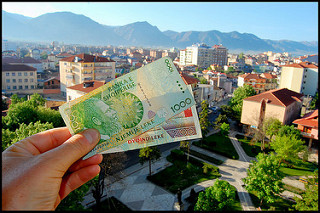
A good day's wage in Albania (1200 leke/£8.40) making work over the border in Greece a prospect many see as worth taking risks for.
For more about 'The Migrant' click on the cover:

The Albania to Athens quiz
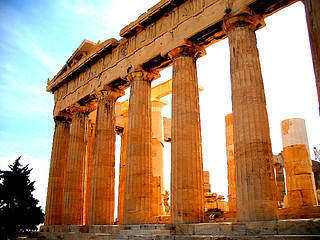
Check your general knowledge of Albania and Greece. Try this free, easy quiz on Goodreads drawn from my novel ‘The Migrant’.
What is the road border crossing from Albania to Greece (near Bilisht) called by people on the Albanian side?
Who was the Prime Minister of Greece in September 2012 when events in the story are set?
The quiz is here: https://www.goodreads.com/quizzes/113...

